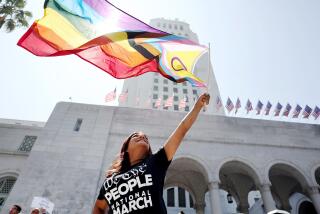Equal Protection for the Last Outcasts
- Share via
Earlier this month, Maine voters repealed that state’s law prohibiting discrimination against lesbians and gay men. Why do most Americans continue to exclude gay men and lesbians from the ranks of citizens whose rights to equal protection of the laws are the same as everybody else’s?
The answer is contained in a recent opinion sampling by Alan Wolfe of Boston University, who found that middle-class Americans no longer believe that Jews, Muslims or atheists are inherently less worthy than Christians. But Wolfe notes one exception to “America’s persistent and ubiquitous nonjudgmentalism.” No matter how much they are willing to accept most things, Wolfe said, “most of the middle-class Americans I spoke to were not prepared to accept homosexuality.”
Given the homophobic character of so many of our formal and informal traditions, the calculated campaign of the anti-gay religious right to reactivate those traditions in the cause of their special interest in American politics and the prudery of public conversation if not conduct, we should not be surprised. Were Americans to look candidly at human sexuality, they might recognize that erotic response is not fixed but changeable and that “straight” and “gay” are convenient terms to describe a pattern of variation, not an either/or identity. But why won’t Americans recognize lesbians and gay men as their fellow citizens entitled to the same constitutional rights?
It appears that most Americans continue to think that one chooses to be gay. If you think homosexuality is a choice, it is easier to think that discrimination one suffers on account of sexuality is not a constitutional or social issue, but the consequence of a personal “lifestyle choice.”
Equal protection of the laws applies to persons because of who they are rather than what they must do to deserve it. The notion that one chooses one’s sexual desires in effect removes those desires from the realm of constitutional protection. But do homosexuals “choose” their sexual orientation? No. Lesbians, gay men and bisexuals have within them, just as “straights” do, the congeries of elements that create individual sexual desire. Gays do not choose to be gay, but they do in ever growing numbers choose to live their lives in harmony with their inner truths.
The choice gays have come to is not to have same-sex relations; people have always done that. The choice is whether being homosexual is something to deny or to venture. The choice is one the sexual majority need not make. Heterosexuals can skip over the process of having to choose to be who they are and go directly to conduct. One can choose to be monogamous, to live according to a morality of sexual conduct, to live out one’s feelings honestly and ethically. Those are the choices that lesbians and gay men would like to make for ourselves.
Gay rights are at the core an attempt to gain equal protection of the law for one’s intimate associations. You cannot have privacy if you must conduct your personal life in secret. The “don’t ask, don’t tell” policy in the military is just one example of this double bind. Lesbians and gay men must choose daily whether to deny our feelings and natures in order to live freely, to have our work and lives judged by the way we live them and not by whom we live them with.
More to Read
Sign up for Essential California
The most important California stories and recommendations in your inbox every morning.
You may occasionally receive promotional content from the Los Angeles Times.












